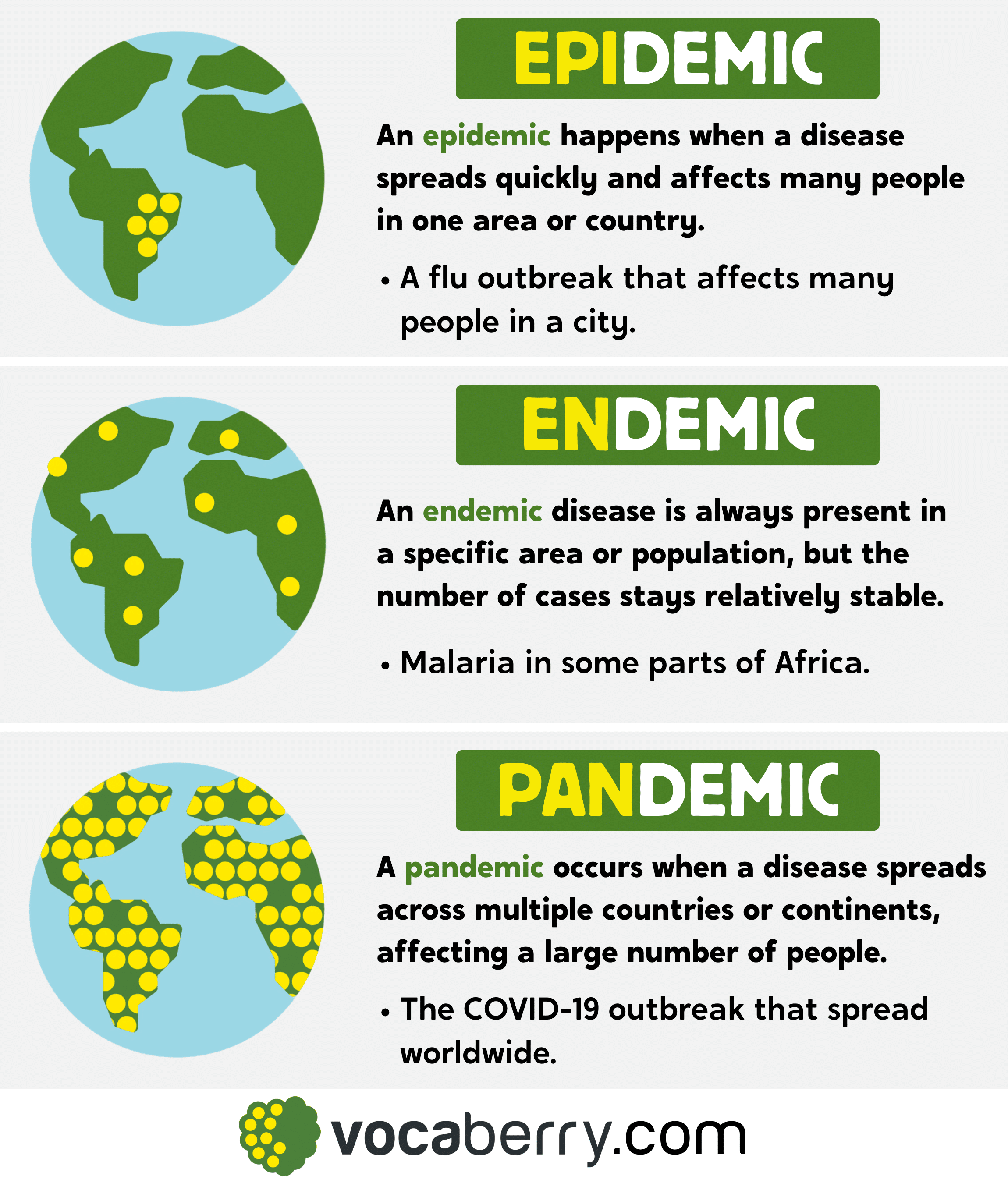
Health-related terms like epidemic, endemic, and pandemic are often used when discussing diseases, outbreaks, and global health. Understanding these terms is essential for following news, medical reports, and everyday conversations about public health. In this article, we will explain the difference between epidemic, endemic, and pandemic, provide real-life examples, and test your knowledge with a quiz at the end.
What is an Epidemic?
An epidemic is when a disease spreads rapidly in a specific region or population. It affects a large number of people within a short period but is limited to a certain area.
Example:
- The Ebola outbreak in West Africa in 2014 was an epidemic.
- Seasonal flu can sometimes become an epidemic if it spreads unusually fast in a country.
Key Points:
- Affects a large number of people.
- Happens in a specific area or country.
- Spreads quickly but can be controlled.
What is an Endemic?
An endemic disease is one that exists constantly in a particular region, country, or population. It does not spread rapidly like an epidemic, but it remains present over time.
Example:
- Malaria is endemic in many parts of Africa.
- The common cold is endemic worldwide, as it never fully disappears.
Key Points:
- A disease that stays in one region or population.
- It does not cause sudden outbreaks like an epidemic.
- Can still affect many people but is considered normal in that area.
What is a Pandemic?
A pandemic is a disease that spreads across multiple countries or continents, affecting a large portion of the world’s population. Unlike an epidemic, which is limited to one area, a pandemic is global.
Example:
- The COVID-19 pandemic (2020) affected the entire world.
- The Spanish Flu pandemic (1918) killed millions worldwide.
Key Points:
- A disease that spreads globally.
- Affects millions or billions of people.
- Can cause major health, economic, and social impacts.
Comparison Table: Epidemic vs. Endemic vs. Pandemic
| Term | Definition | Key Features | Example |
|---|---|---|---|
| Epidemic | A disease spreading rapidly in one region | Short-term, sudden outbreak | Ebola in West Africa (2014) |
| Endemic | A disease that exists continuously in one area | Long-term, constant presence | Malaria in Africa |
| Pandemic | A disease that spreads worldwide | Global outbreak, large-scale impact | COVID-19 (2020) |
Epidemic, Endemic, and Pandemic Quiz
1. Which term describes a disease that spreads worldwide?
a) Epidemic
b) Endemic
c) Pandemic
2. Malaria is a constant health issue in some countries. It is considered:
a) Endemic
b) Epidemic
c) Pandemic
3. A sudden outbreak of a disease in one city or country is called:
a) Pandemic
b) Epidemic
c) Endemic
4. Which of these diseases was a global pandemic?
a) The common cold
b) COVID-19
c) Seasonal flu
5. If a disease suddenly spreads fast in a country, it is an:
a) Epidemic
b) Endemic
c) Pandemic
6. A disease that remains in one region permanently is:
a) Epidemic
b) Endemic
c) Pandemic
7. What is the difference between a pandemic and an epidemic?
a) Epidemics are larger than pandemics.
b) Pandemics spread worldwide, while epidemics stay in one area.
c) They mean the same thing.
8. The flu is always present in many countries. It is considered:
a) Endemic
b) Epidemic
c) Pandemic
9. The Spanish Flu of 1918 was a:
a) Pandemic
b) Epidemic
c) Endemic
10. If a local outbreak of a disease is not controlled and spreads across countries, what does it become?
a) Epidemic
b) Pandemic
c) Endemic
Quiz Answers
1) Pandemic
2) Endemic
3) Epidemic
4) COVID-19
5) Epidemic
6) Endemic
7) Pandemics spread worldwide, while epidemics stay in one area.
8) Endemic
9) Pandemic
10) Pandemic







your page is awesome and the best <3